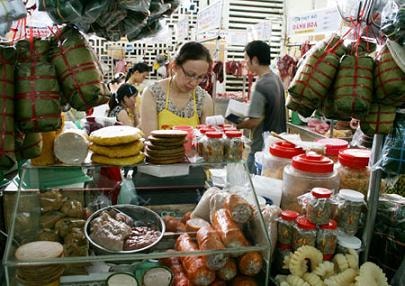Food Safety Law before G hour
On July 1, 2011, the Food Safety Law will officially take effect. The draft Decree detailing a number of articles of the Law is also being gradually completed.
Hard to do
Prof. Dr. Phan Thi Kim, former Director of the Department of Food Safety of the Ministry of Health, President of the Vietnam Association of Food Safety Science and Technology, emphasized that human health issues must be given special attention. The fact that the Law on Food Safety is about to take effect is of great significance, therefore, despite the difficulties, the Decree guiding the Law must try to resolve thorny issues for the sake of people's health.
According to experts, the current food safety quality in the world is very worrying, potentially causing many diseases for consumers. Pathogens can contaminate food from production to transportation and storage. As a result, in many developing countries, up to 3/4 of the population is infected with worms, the cause of which is eating unsanitary food.

Food safety issues will be better managed when the Food Safety Law takes full effect from July 1.
Unsafe food containing toxic chemicals is the cause of 35% of cancer cases in poor countries. It is worth noting that not only small-scale production facilities violate food safety standards, but even large multinational companies sometimes seriously violate them.
According to the Ministry of Agriculture and Rural Development, there are currently 200 trading companies, 79 production facilities and 29,000 stores selling plant protection drugs nationwide, mainly importing goods for decanting and packaging. Every year, inspections at border gates still show that 4-5% of imported shipments do not meet requirements.
Statistics from the Ministry of Health show that from 2004 to 2009, there were 1,058 food poisoning cases nationwide, resulting in 298 deaths, with an average of 176.3 cases/year and 5,302 people suffering from food poisoning/year. In 2010 alone, there were 175 food poisoning cases nationwide, including 34 cases involving over 30 people, resulting in 5,664 people being infected and 42 deaths.
Clear division of responsibilities
Associate Professor, Dr. Tran Dang, Chairman of the Vietnam Dietary Supplement Association, former Director of the Department of Food Safety and Hygiene, said that food safety management in our country has many difficulties, partly due to people's living habits.
Currently, there are about 9 million households producing and trading food nationwide. Although management has been strengthened, in recent years, the problem of residual preservatives, chemicals, and substances harmful to consumers' health has not been well controlled.
According to data from the Ministry of Agriculture and Rural Development, inspection results in some localities showed that 30% of agricultural materials production and trading establishments did not meet requirements; 60% of seafood; 68% of veterinary drugs and plant protection products; 67% of fruit and vegetable processing establishments; many livestock and poultry slaughterhouses did not have licenses and were not managed in a unified manner.
It is a fact that there are about 30,000 industries with overlapping management between the three ministries: Agriculture and Rural Development, Health and Industry and Trade. The division of food safety management between these three ministries has not yet achieved good results. Therefore, people are expecting the Food Safety Law to take full effect from July 1 to resolve outstanding issues related to people's health.
Currently, the Draft Decree detailing the implementation of a number of articles of the Food Safety Law, drafted by the Ministry of Health, is being brought out for comments from experts, businesses and the public. In particular, the management responsibilities related to the Ministries have been specifically assigned. In addition, the draft decree also clearly stipulates the decentralization of food safety management to People's Committees at all levels.
According to the draft, the Ministry of Health has the main responsibility. This is agreed by most experts, because there must be a specialized agency to avoid the situation of shirking responsibility. According to Associate Professor, Dr. Tran Dang, the Ministry of Health "must ensure that the food is safe before consumers put it in their mouths".
In fact, most countries in the world assign the primary responsibility for food safety management to the Ministry of Health. In the US, there is the Food and Drug Administration (CDC), and China also has a similar agency.
However, according to many experts, although there is a division of responsibilities between ministries and branches, in reality, it is not easy to clearly define them. Therefore, there needs to be close coordination between ministries, branches and local authorities in state management of food safety with the goal of protecting people's health.
According to VOV






